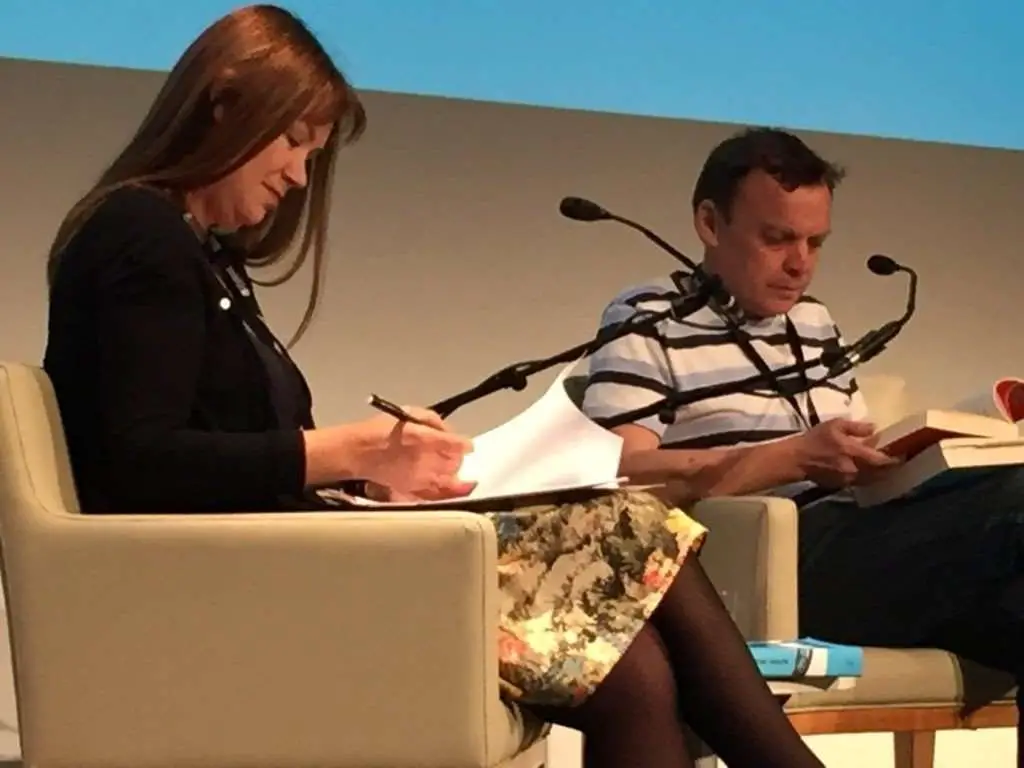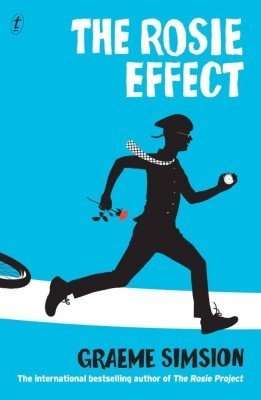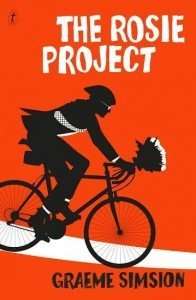Graeme Simsion at the Brisbane Writers Festival
It’s not often that you walk into a writers festival venue and find the guest author not on the stage but amongst the audience, welcoming and chatting to people as they find their seats.
And so we began the session ‘The Rosie Effect’ with author Graeme Simsion and interviewer Joy Lawn.
 Graeme brought Don Tillman’s voice to life, treating us with passages from The Rosie Project describing Don’s inspiration for the original ‘wife project survey’ as well as the empirical research he undertakes into childhood development in a New York park in The Rosie Effect.
Graeme brought Don Tillman’s voice to life, treating us with passages from The Rosie Project describing Don’s inspiration for the original ‘wife project survey’ as well as the empirical research he undertakes into childhood development in a New York park in The Rosie Effect.
I didn’t set out to write someone with Asperger’s, I set out to write a guy who was socially awkward but I drew upon many people that I’d known studying physics, working in information technology, going back to university to do a PhD, I met a lot of men particularly who were socially awkward, and I wanted to put this guy in the book.
Graeme explains he does not identify as having Asperger’s himself but that it was very easy for him to write Don given his own scientific/technological background.
Don is first and foremost a scientist and he brings a scientific approach… Sure I knew a lot of people like Don, but to inhabit his space I just imagined I was solving a computer program problem, or similar technical problem, but now in a social environment.
Graeme spoke candidly about there being plenty of people that didn’t like The Rosie Effect, but how the ‘happily-ever-after’ of The Rosie Project was unrealistic to maintain in a secondbook about married life, particularly for someone like Don Tillman. He explained that he intentionally put Rosie in a stressed position, out of sorts and a bit down while she’s pregnant worried about Don’s ability to cope with fatherhood – this meant she was unavailable to help Don, because readers needed to see Don stepping up to the plate.
Graeme discussed the importance of the changes we see in Don in The Rosie Effect, saying “that level of personal development would be expected of any real person that has gotten married and moved to New York”.
 In response to Joy’s question about what someone outside of the traditional arts field can bring to novel writing, Graeme spoke with conviction about creativity actually playing a large role in highly technical fields like information technology. A point very well-made in my opinion. He also explained that prior to The Rosie Project he’d written two non-fiction books and learned how to manage a big long writing project, and that he took great pride in communicating in his technical field.
In response to Joy’s question about what someone outside of the traditional arts field can bring to novel writing, Graeme spoke with conviction about creativity actually playing a large role in highly technical fields like information technology. A point very well-made in my opinion. He also explained that prior to The Rosie Project he’d written two non-fiction books and learned how to manage a big long writing project, and that he took great pride in communicating in his technical field.
A lot of what I did in past jobs was salvageable, adaptable to working as a novelist – plus it gave me material. There are scientific aspects and people coming out of a scientific background and academia that probably wouldn’t be as familiar to someone who had worked in the arts all the time.
He also discussed the value of his life experience when he began studying screenwriting at the age of 50 – he’d run a business, he’d been a boss.
I’m not a ‘pantser’, I’m a planner.
Graeme described his novel writing process, laying out one card per scene, as you would in screenwriting. He explained, “I review the plots before I start writing, and then when it comes to write I’m not worried because I know where I’m going. As I write my creativity can then concentrate on getting the best prose, or in comedy, the best one liners I can, rather than worrying about who is this character, where is this going?”
While Graeme clearly enjoys writing the comedic scenes, he stresses that despite the humour, what underpins The Rosie books is serious drama.
The people who inspired the Don Tillman character in particular, are people who are my friends, my colleagues, people who I have enormous respect for.
He shared with us that the particular individual that contributed the most to the Don Tillman character is “a better man than I am… he looked after a wife who was very ill with dementia for many years, so he is just a fantastic role model. So that guy on the page, we’re not holding him up to be laughed at, you’ve got to feel something under that.” Tim Ferguson, Graeme’s comedy mentor who has multiple-schlerosis, does stand-up about his own condition. Graeme has taken on board Tim’s motto, “make them laugh, make them cry, make them think”.
 Graeme spoke to the way in society today we are bombarded by professional advice, and how professionals sometimes exceed their authority (and potential reasons for that). He explained that many of his ensemble cast in The Rosie books are inspired by people he or his wife know.
Graeme spoke to the way in society today we are bombarded by professional advice, and how professionals sometimes exceed their authority (and potential reasons for that). He explained that many of his ensemble cast in The Rosie books are inspired by people he or his wife know.
Simsion surprised us by declaring he doesn’t watch or read ‘Aspergers fiction’.
He’s never seen ‘Doc Martin’, ‘The Bridge’, ‘The Big Bang Theory’ – because he doesn’t want to inadvertently steal material. When people say to him, “It’s like being inside Sheldon Cooper’s head,” he likes to be able to tell them that he’s never watched The Big Bang Theory. He spoke passionately about the casual prejudices that still occur in society today.
If these guys have Asperger’s well we’re seeing Asperger’s, but let’s see if we can get beyond that and recognise that these guys have got things in common but they’re also individuals in their own right.
He considers Don exactly the same as anyone else emotionally, so he gave him normal emotions, but he’s just not as astute as other people as recognising what’s going on socially.
That’s the mistake people make about people like Don, they think that their inability to understand what’s going on in a situation means they don’t feel. Don feels just as much as everyone else.
Graeme explained that while people may worry that they are laughing at Don, we are simply laughing at any differences to conventional behaviour. Much of the humour in The Rosie books is either observational or situational (e.g. Don’s ‘rational’ decision to use a third toilet as an office). He rates ‘the blue fin tuna incident’ and ‘Don taking charge when Sonya goes into labour’ as his favourite comedy set pieces. I myself loved ‘the blue fin tuna incident’ and was outraged to hear that his US editors originally wanted to take that scene out simply because it did not feature Rosie. Thankfully he won the fight to keep it in.
 Grame described how he actually spent 5 years writing The Rosie Project as a screenplay but could not get funding to make the film. So he decided to turn it into a novel – which took 4 weeks to draft and 3 weeks to tidy up – and it was that 7 week version of the novel that secured him the publishing contract.
Grame described how he actually spent 5 years writing The Rosie Project as a screenplay but could not get funding to make the film. So he decided to turn it into a novel – which took 4 weeks to draft and 3 weeks to tidy up – and it was that 7 week version of the novel that secured him the publishing contract.
Now, years later, when asked about the status of The Rosie Project movie, Graeme’s wise response was “nothing is guaranteed in Hollywood until the cameras roll”.
Sony Pictures optioned the rights to the screenplay written by Graeme. They’ve paid for A-list screenwriters Scott Neustadter and Mike Weber who did the movie adaptations of ‘The Fault in Our Stars’ and ‘Me Before You’, to re-write it and Jennifer Lawrence has been cast to play Rosie. Lawrence read the script and actually approached Sony about the role, which surprised Graeme as he thought she’d see the role as too similar to ‘Silver Linings Playbook’, but gave kudos to her appreciation that Rosie is very different.
 When might the cameras roll? Sony is speaking to Richard Linklater about directing, and Jennifer Lawrence is available for filming in April 2016. And who will play Don? Sony were previously talking to Leonardo DiCaprio and Ryan Gosling, but Graeme suggests that role is now up for grabs — the age gap needs to be considered now that Jennifer Lawrence is locked in for the Rosie role. On the topic of artistic control, he’s quite philosophical, saying “There are so many people that collaborate to create a movie — if they come together right we could end up with something that is great than the book.”
When might the cameras roll? Sony is speaking to Richard Linklater about directing, and Jennifer Lawrence is available for filming in April 2016. And who will play Don? Sony were previously talking to Leonardo DiCaprio and Ryan Gosling, but Graeme suggests that role is now up for grabs — the age gap needs to be considered now that Jennifer Lawrence is locked in for the Rosie role. On the topic of artistic control, he’s quite philosophical, saying “There are so many people that collaborate to create a movie — if they come together right we could end up with something that is great than the book.”
The book is my statement, not the film – so I can hold the book and say, that’s exactly what I intended. But now another artistic product is being made from it, I was part of that, but not all of that, and it is what it is…. There’s no point losing sleep over things you can’t control.
MOVIE UPDATE: Ryan Reynolds to star in rom-com The Rosie Project
And what can we look forward to from Graeme Simsion next?
He does intend for there to be a third Rosie book (the last), several years in the future focussing on what it’s like bringing up kids, and the extent to which parents inevitably impose their own views on their children. Two books are planned for publication before that however. The first is with the publisher at the moment, it’s called ‘The Best of Adam Sharp’, about a relationship rekindled after 22 years. Then he’s writing a book with his wife Anne Buist, tentatively called ‘Left Right’, a love story set on the famous Camino de Santiago pilgrims walk from France to Spain, told from two perspectives.
UPDATE: Read our review of The Best of Adam Sharp, released 19 September 2016.
